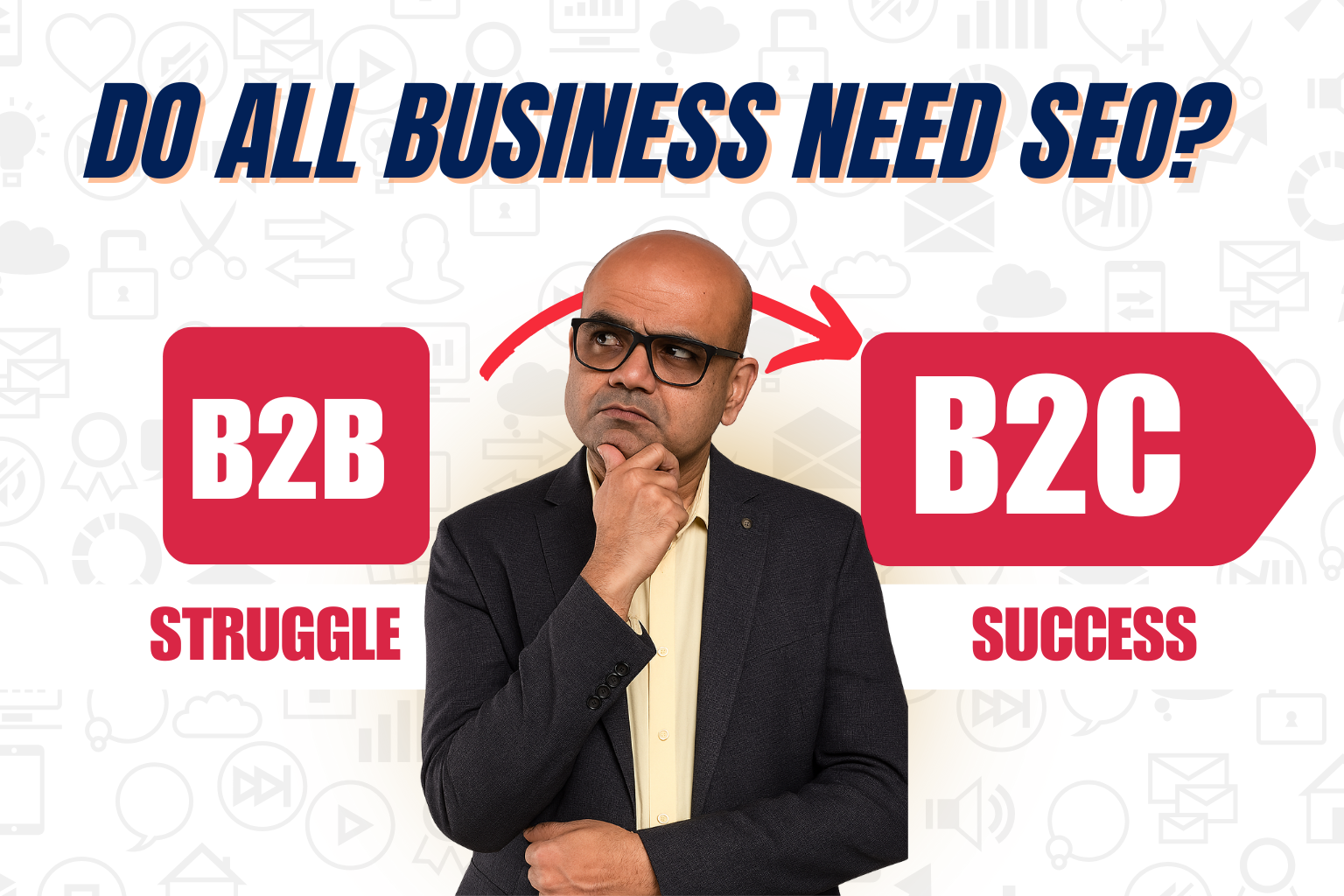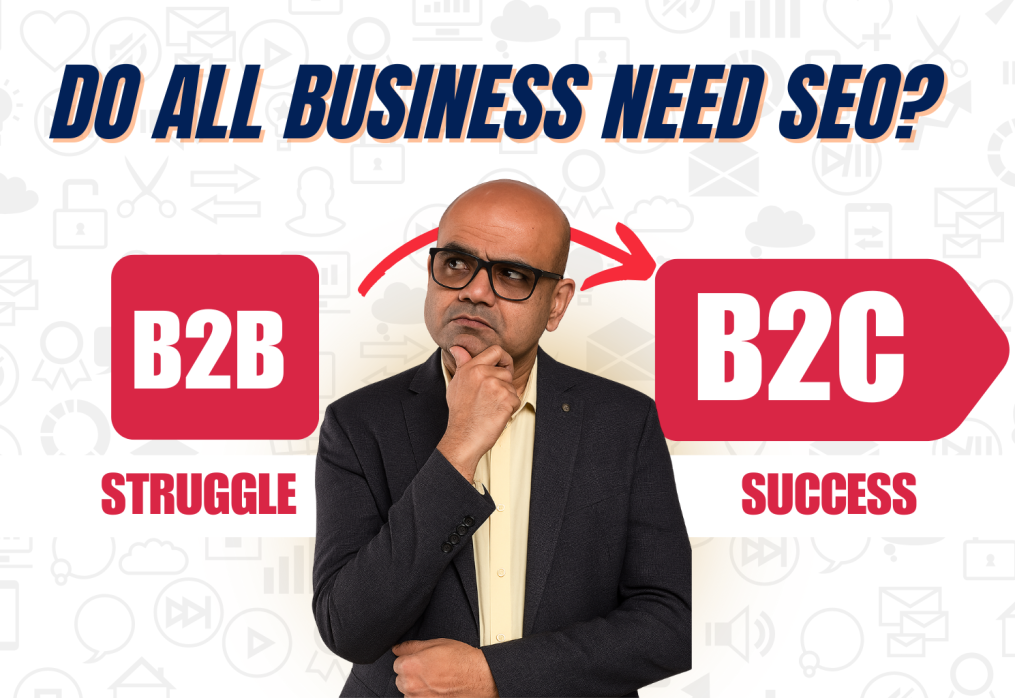Do All Businesses Need SEO? What B2B and B2C Companies Must Know
22/07/2025
Yes. all businesses, whether B2B or B2C, need search engine optimization. Even sectors that are traditionally offline and in which deals are often closed without the web in between require SEO to remain visible, competitive, and cost effective.
Why All Businesses, B2B and B2C Need SEO?
Whether you sell to other businesses (B2B) or directly to consumers (B2C), your prospective customers are searching online before they make any decision. Even when the sale itself is offline, whether in a store, over the phone, or at a trade show, buyers still go to Google first to:
- Check your credibility.
- Compare you with competitors.
- Find contact details and locations.
So if you’re missing from the search results, you’re missing out on valuable inbound traffic and trust signals. Here are some of the risks of not investing in SEO for your business:
Loss of local search traffic
If you’re a local business, your potential customers are searching for “near me” every day. If your website and local business listings are not SEO optimized, they won’t see your brand when looking for your services.
No organic search visibility
Your brand doesn’t appear in the unpaid search results that most users trust most. When a user searches for “software as a service,” your website doesn’t even show up. They only see your competitors.
Overreliance on paid ads
You have to spend more and more money on ads just to maintain a presence in the first place. You’re not building up long-term equity or ownership of your keywords. That means less and less return on your ad spend.
How All Businesses Can Benefit from SEO:
SEO, or search engine optimization, is the process of optimizing your website and content to rank higher in search engine results pages (SERPs) like Google’s. It’s the bedrock of organic marketing because it gives your site more exposure without the ongoing costs of paid ads. This is true for both B2B and B2C companies because SEO can:
Drive inbound traffic and leads
SEO brings in website visitors who are actively looking for your products or services. These are high-intent visitors that are more likely to convert into leads or sales.
Build credibility and trust
Appearing at the top of search results for relevant queries is a signal of authority and trustworthiness. It also increases your brand’s perceived value.
Reduce customer acquisition costs
SEO is a cost effective marketing strategy compared to other channels. It has a compounding effect: the more you invest, the more traffic and value you get.
Example B2C: Business Sells Directly to Consumers
A business that sells products or services directly to the end user will have a shorter sales cycle. However, they still need SEO to drive traffic to their website and capture potential customers. Local SEO, online reviews, and mobile search are important for B2C businesses because these are how consumers discover and research local options.
How B2B SEO Differs from B2C SEO?
SEO is similar for B2B and B2C businesses, but the approaches have some key differences. Here are a few things to keep in mind when crafting your SEO strategy based on your business model:
Understanding the difference between B2B and B2C SEO is crucial for building an effective strategy:
| Aspect | B2B SEO | B2C SEO |
|---|---|---|
| Content Type | Technical blogs, whitepapers, case studies | Product pages, reviews, lifestyle blogs |
| Sales Cycle | Longer, multi-touch, research-driven | Shorter, impulse-driven |
| Keyword Focus | Niche, low-volume, high-value | Broad, high-volume, transactional |
| Decision Makers | Multiple stakeholders, committees | Individual consumers |
| Conversion Goal | Lead generation, demo requests | Direct sales, sign-ups |
SEO in 2026: Trends to Know
SEO in 2026 is not much different from SEO today. Search engine algorithms and user behaviors will have evolved, but the overall approach and strategy will remain the same. In fact, some of these core principles will become even more important by 2026 because of the following trends:
AI, machine learning and automation in search
The algorithms that power search engines will continue to get smarter and more sophisticated. SEOs will need to adapt to these changes and use new tools and techniques to optimize their websites. It is not an option anymore, businesses have to understand and practice new trends to get ranked not only in SEO, AI is ruling the market where AEO (Answer engine Optimization) & GEO (Generative engine Optimization) is a must to be adopted to increase visibility.
Voice search
Voice assistants like Amazon’s Alexa, Apple’s Siri, and Google Assistant will become more popular. This means that more people will be using voice search to find information online.
Increased focus on user intent
Search engines are getting better at understanding user intent and serving up the most relevant results. SEOs will need to focus on aligning their content with user needs and queries.
Local and hyperlocal SEO
Local SEO will become even more important as businesses continue to compete for local customers. Hyperlocal SEO will also become more critical as businesses target specific neighborhoods or regions.
Mobile search
Mobile search will continue to grow, and SEOs will need to ensure that their websites are optimized for mobile devices.
Social media SEO
Social media will continue to play a significant role in SEO. SEOs will need to focus on optimizing their social profiles and content for search.
Semantic search
Search engines will get better at understanding the meaning behind search queries. SEOs will need to create content that answers questions directly and comprehensively.
Voice search optimization
As voice search becomes more popular, SEOs will need to optimize their websites for voice queries.
AI and machine learning in content creation
AI and machine learning will be used to create content that is optimized for search. SEOs will need to learn how to use these tools to their advantage.
Data analytics
Data analytics will play a more important role in SEO. SEOs will need to use data to inform their strategy and optimize their websites.
These are just a few of the trends to expect in SEO in 2026. SEOs that stay on top of these changes will be well positioned to optimize their websites for the future.
New Data:
📊 BrightEdge (2025):
Organic search delivers up to 53% of all website traffic, worldwide. SEO and content marketing statistics for 2025.
🧠 Gartner (2024):
By 2026, 25% of search engine queries made using the traditional Web interface will be redirected to AI and voice assistants.
💰 Statista (2025):
SEO’s average return on investment compared to other digital marketing channels in the 3 year period to 2025.
Paid Ads vs SEO vs Social Media: ROI Comparison
| Channel | ROI (3-Year Avg) | Trust Factor | Cost-Effectiveness |
|---|---|---|---|
| SEO | High | High (organic) | Compounding, low CAC |
| Paid Ads | Medium | Medium (ad label) | High ongoing spend |
| Social | Variable | Medium-High | Depends on engagement |
In 2026, SEO will remain the best long-term investment for any website, B2B or B2C. This is because SEO, when done right, has a lower total cost of ownership than paid ads. Organic traffic from SEO is also more sustainable, targeted, and profitable over time. The average return on investment (ROI) in SEO, for example, is 5 times greater than paid ads after three years. This is the typical period needed to see compounding SEO results.
SEO also drives social media traffic. In fact, social signals, such as likes, shares, and comments, are used by search engines as one of the ranking factors. So when you’re investing in social, you should also be optimizing your social profiles and content for search. This way, your social marketing efforts will not only boost your brand awareness and engagement but also support your SEO goals.
In conclusion, SEO is essential for any business in 2026, B2B or B2C. It is the foundation of any digital marketing strategy, and it pays off more than other channels in the long run. If you’re ready to start optimizing your website and content for search, or if you have any questions about SEO, please feel free to contact us at support@onedotm.com
The 5 Benefits of SEO Optimization for All Businesses
SEO helps your business grow in 2026 by:
- Delivering a sustainable source of traffic and leads: SEO drives qualified, targeted visitors to your website without ongoing costs.
- Building brand authority: SEO positions your business as an industry leader.
- Reducing customer acquisition costs: SEO is cost-effective compared to other marketing channels and has a compound effect.
- Staying ahead of the competition: SEO helps you beat competitors for online visibility and share of voice.
- Adapting to any business model: SEO strategies work for B2B and B2C, local and global, online and offline businesses.
The Importance of SEO for Digital Marketing
SEO is the foundation of digital marketing. It supports all other marketing channels and efforts and ensures that your business is discoverable wherever your customers are searching. So if you’re not investing in SEO for your business in 2026, you’re missing out on a huge opportunity to grow and scale.
Ready to Grow?
Get a Free SEO Audit
Whether you’re B2B or B2C, local or global, you need SEO in 2026. If you’re not sure where to start or if you want to see the state of your website and marketing for free, contact Onedot Media for a free SEO audit or consultation today. Let us help you grow and succeed in the digital first world.
